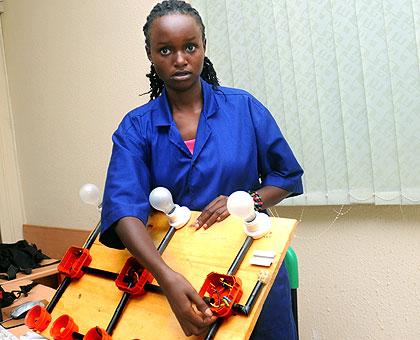JOBS:Strategy to end unemployment Investors in technical and professional institutions have welcomed the government’s decision to prioritise technical and professional training, saying it will help address the problem of unemployment.


JOBS:Strategy to end unemployment Investors in technical and professional institutions have welcomed the government’s decision to prioritise technical and professional training, saying it will help address the problem of unemployment.Several heads of private technical schools, who spoke to The New Times, observed that lack of enough qualified local personnel had led the country to rely on foreign manpower, which they say is costly.Francois Habyarimana, the Director of Musebeya Vocational Training College (VCT) in Nyamagabe District, noted that the private sector should take an upper hand, but added that the government should support them to achieve the targets."The country’s decision is a great step towards building a highly skilled community. We started in 1989 when technical schools were being underrated; for the government to come out and prioritise it, we see it as a great step towards empowering Rwandans. We see it as a move to achieve our vision,” Habyarimana said.The government, last week announced that by 2017, the number of students pursuing TVET courses will be increased to 60 percent, up from the current 40 percent of the total secondary students population.The move will see some 12-Year Basic Education schools phased out and turned into TVET centres and also construct at least 90 other technical schools across the country.Habyarimana, however, called upon the government to support private investors acquire the necessary materials, such as infrastructure and machines."Establishing a Technical and Vocational Education Training (TVET) school is very expensive, especially acquiring equipment. This is a major challenge affecting private and public technical schools. Sometimes replacing the old equipment is difficult and this is where the government should step in,” he noted. The government provided incentives to private developers who want to start TVET schools. These include waiving taxes on imported equipment, training staff and offering technical assistance in making standard architectural designs.Tharcisse Nzayisenga, the Director of Lycee de Nyanza Technical Secondary Schools (TSS) also commended the government’s idea, saying it will help in building a job creating community. "This whole idea is good. It will support children of this country to be job creators rather than depending on theoretical education. It will help the country to develop faster,” stated Nzayisenga.He observed that technical professionals, in one way or another, never fail to get what to do compared to someone who only learnt theory.Paul Padua, the proprietor of Prime Autocare Garage, noted that most of their mechanics are incompetent."All I can say is that almost all garages use people who are not qualified and don’t give required services; not even 20 percent of people working in garages have the required skills. The government and the private sector need to do more to fill this gap,” he said. He explained that owners of garages have embarked on offering training to their staff "to try and fill the gap.”Didier Munezero, the Director of partnership building in Workforce Development Authority (WDA), the government department charged with overseeing technical schools, said their support helps private investors since it meets the standards of schools required."We help them design standardised architectural designs of infrastructures and give them a list of standardised equipment. These help them to access bank loans since financial institutions will be convinced that they are investing in quality and long lasting businesses,” Munezero said.


